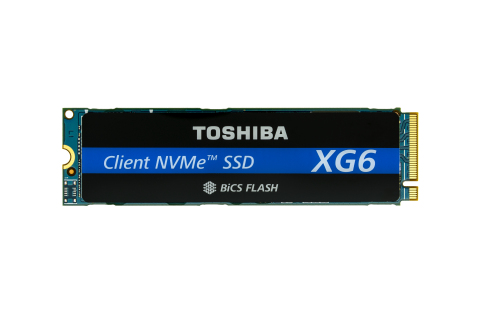New XG6 NVMe SSD Offers Improved Performance and Power Efficiency for PC, Server and Embedded Applications
SAN JOSE, Calif. — (BUSINESS WIRE) — July 23, 2018 — Today Toshiba Memory America, Inc., the U.S.-based subsidiary of Toshiba Memory Corporation, has introduced a new lineup of solid state drives (SSDs) that are based on its 96-layer, BiCS FLASH™ 3D flash memory. The first SSD to use this breakthrough technology1, the new XG6 series is targeted to the client PC, high-performance mobile, embedded, and gaming segments – as well as data center environments for boot drives in servers, caching and logging, and commodity storage.
This press release features multimedia. View the full release here: https://www.businesswire.com/news/home/20180723005775/en/

Toshiba Memory's new XG6 series of SSDs is the first to use 96-layer BiCS FLASH 3D flash memory. (Photo: Business Wire)
As the inventor of flash memory and the first to introduce the concept of 3D flash memory, Toshiba Memory is driven to continually push the boundaries of what is possible – and move the technology forward. Its 3-bit-per-cell (triple-level cell, TLC) BiCS FLASH technology improves the performance, density and efficiency of SSDs. And its innovative 96-layer stacking process combines with advanced circuit and manufacturing technology to achieve a capacity increase of approximately 40 percent per unit chip size over 64-layer 3D flash memory.
The introduction of the XG6 series paves the way for Toshiba client, data center and enterprise SSDs to migrate to 96-layer technology. Speaking to the game-changing capabilities of the company’s continued enhancements to BiCS FLASH, Jeremy Werner, vice president of SSD marketing and product planning for Toshiba Memory, noted, “Toshiba Memory is at the forefront of 3D flash memory development with 96-layer BiCS FLASH. SSDs pose the most formidable flash design challenge, and becoming the first company in the world to bring an SSD to market with the most advanced flash node is an achievement that is only possible due to our years of commitment to advancing our SSD technology.”
The new XG6 series is available in an M.2 2280 single-sided form factor and supports PCI Express®2 Generation 3x4 lane and NVM Express™3 revision 1.3a. A powerful combination of efficiency and performance is a hallmark of the XG6 series, which consumes 4.7W or less of power and reaches up to 3,180MB/sec of sequential read4 and nearly 3,000MB/sec of sequential write, and up to 355,000 random read and 365,000 random write IOPS5. Achieved by optimizing SoCs, the sequential write performance of the XG6 series leads the industry.
Additional Features Include:
- Security: Pyrite or self-encrypting drive models supporting TCG Opal Version 2.01, as well as support for block SID and digital signature
- Support for user-selectable over provisioning feature through NVMe command
- Top-of-the-class sequential performance (client class)6
- Enhanced SLC buffer to improve drive performance for client workloads
“The industry continues to transition to higher densities of 3D flash technology, with 3D NAND petabytes growing at a CAGR of 75 percent out to 2022,” said Greg Wong, founder and principal analyst of Forward Insights. “The introduction of 96-layer is an important milestone for flash to meet the increasing demand for faster and denser storage.”
Well-suited to a wide range of read-intensive applications that prioritize power efficiency, burst performance and a compact footprint, the XG6 series will be available in capacities of 256, 512 and 1,024 gigabytes7,8. The new SSDs are currently sampling to select OEM customers and will be demonstrated at the Flash Memory Summit in Santa Clara, California, from August 7 – 9 in Hall A, booth #307.
For more information, please visit business.toshiba-memory.com.
About Toshiba Memory America, Inc.
Toshiba Memory America, Inc. is the U.S.-based subsidiary of Toshiba Memory Corporation, a leading worldwide supplier of flash memory and solid state drives (SSDs). From the invention of flash memory to today’s breakthrough 96-layer BiCS FLASH™ 3D technology, Toshiba continues to lead innovation and move the industry forward. For more information, please visit business.toshiba-memory.com and follow the company on LinkedIn, Twitter ( @Toshiba_Memory) and Facebook.
© 2018 Toshiba Memory America, Inc. All rights reserved. Information in
this press release, including product pricing and specifications,
content of services, and contact information is current and believed to
be accurate on the date of the announcement, but is subject to change
without prior notice. Technical and application information contained
here is subject to the most recent applicable Toshiba product
specifications.








